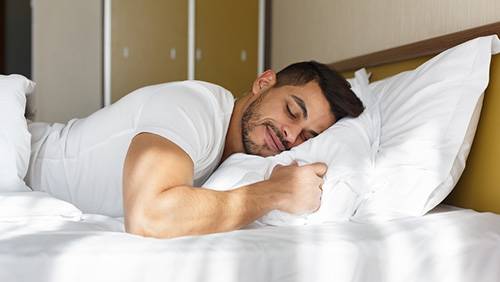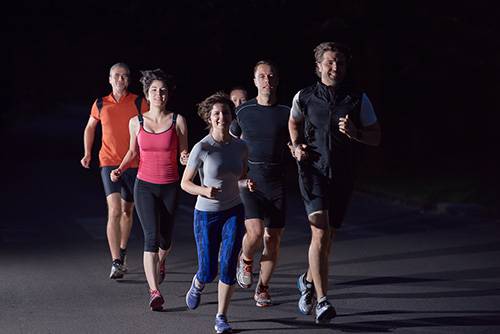Do you have a busy schedule? You’re certainly not alone. Despite living in the age of modern convenience, as economies grow, every hour becomes more valuable. This makes it difficult to consistently fit in ample time for health and wellness. For many, the only available slot for working out falls within the p.m. hours.
This leads many to ask, “does exercising at night affect one’s sleep?” After all, it’s the time of day we’re supposed to be winding down. This common question requires some explanation, so let’s delve into the nuts and bolts of the evening workout and its impact on sleep.
Novel Study Sheds New Light on Sleep and the Evening Workout
It seems like studies come out every day shedding new light on our daily lives. In the past, experts recommended not exercising in the evening to avoid interference with restful sleep. However, Sports Medicine published a study in October 2018 indicating our previous outlook on the impact of the evening workout on sleep isn’t quite accurate.
Two Key Data Points for Evening Workout Success
Researchers took a look at 23 studies focused on the ability of healthy adults who engaged in evening exercise to fall asleep and enter the most restorative sleep stages. These results were compared with adults of similar health status who had not worked out in the evening. The results provided two important pieces of information to help you manage your evening routine:
- The evening exercisers in general fell asleep more quickly and achieved a higher quality of sleep.
- Evening exercisers who performed interval training like HIIT within an hour of bedtime took longer to fall asleep and had poor sleep quality.
If an evening workout is the only time you can set aside, experts agree this is preferred over no exercise at all. The key is to avoid strenuous anaerobic movements during the later hours of the night.
Adequate Sleep: The Missing Link in Health and Wellness
We’re constantly reminded of the importance of proper nutrition and exercise when it comes to optimal health and wellness. However, adequate sleep is the often overlooked missing link. When acknowledged, it creates the trifecta in the achievement of your ideal fitness. While exercise keeps your body in proper working order, it creates an increased need for adequate rejuvenation. When sleep and exercise are properly balanced:
- Your immune system is optimized.
- Your muscles are able to recover from resistance exercise.
- The ability for new muscles to develop is improved.
- Sleep apnea symptoms are alleviated.
- Issues like depression and anxiety lessen.
- Circadian rhythm is better regulated.
- Risk of osteoporosis is reduced.
Using Exercise to Optimize Sleep
Regardless of time, it’s best to get exercise as opposed to skipping a workout when you can’t do it before the sun goes down. Planning is key. This is especially important if your schedule is subject to change with little notice. By understanding the unique benefits of exercise in the morning, afternoon and evening, you can optimize your sleep.
Pros of the Morning Workout
- Great time to kickstart your metabolism to burn more fat for the rest of the day.
- Helps regulate the circadian rhythm to promote the feeling of sleepiness at the right time.
- Higher testosterone levels are common in the morning, allowing improved performance and deeper sleep that evening.
- Suggested morning workout for great sleep:
High intensity interval training
- Suggested morning workout for great sleep:
Pros of the Afternoon Workout
- Since you’ve had more time to fuel and are already warmed up, risk of injury is reduced.
- Delivers an energy boost when you really need it. If you tend to experience a slump after lunch, this can lead to napping that disrupts sleep in the evening. If this sounds like you, trade in that nap for a sweat session.
- Suggested afternoon workout for great sleep:
Low weight, high-rep resistance training with low-intensity, steady-state cardio intervals.
- Suggested afternoon workout for great sleep:
Pros of the Evening Workout
- Those trying to gain muscle mass can benefit from the fact that muscles increase in strength throughout the day. According to a 2009 study, participants who worked out in the late afternoon to evenings gained more muscle mass than those who worked out in the a.m.
- When you sleep, the body gets to work making repairs, and this is when muscle is built. The evening workout allows this process to get started quickly.
- Suggested evening workout for great sleep:
High-weight, low-rep resistance training
- Suggested evening workout for great sleep:
Tips to Harmonize Your Sleep and Workout Schedules
Time is a limited resource, and many of us have little control over the free time we have available to workout. Ideally, cardio days would take place early in the morning, and strength and conditioning could be saved for a couple nights per week with an afternoon set aside for a cardio/resistance combination session.
If that’s not possible for your schedule, a great place to start in determining the best time to workout for good sleep is to identify what times do work for you. To do so, let’s take a look at some downsides of each time block:
Cons of the Morning Workout
- If you’re typically rushed in the morning or not an early riser, ambitions to consistently log a sweat session with the sunrise often end in disappointment. This, in turn, often leads to a “falling off the wagon” when it comes to fitness. If you don’t see yourself realistically getting up to workout early, you’re setting yourself up for failure.
- If you don’t have time to eat something prior to your morning workout, you may find exercise difficult. Some can handle fasted cardio, others can’t. If you fall in the latter category, you’ll need to get up even earlier for breakfast.
Cons of the Afternoon Workout
- It can be difficult to fit into your schedule, especially if planning around a lunch break.
Cons of the Evening Workout
- Saving high intensity workouts for the end of the day, particularly within an hour of bedtime, can cause sleep disturbances.
- Many people have good intentions early in the day but find they run out of steam by the evening hours and don’t follow through with their workout plans.
What If Evening Workouts Are My Only Option?
If evenings are the only realistic time you can stick to working out, all hope isn’t lost. This is the ideal time for strength training, which works great. It’s the high intensity cardio that becomes a problem. Here are some tips to make evening workouts work:
- Set a regular bedtime. Not only will this help synchronize your circadian rhythm, but it helps establish a routine you’ll get used to.
- Try a five to ten minute HIIT workout early in the morning once or twice per week. They are quick and effective in boosting metabolism long after completion.
- Make sure you have the right mattress to facilitate restful sleep. If it’s time for a new mattress, check out these options designed with the active individual in mind.
- Foam roll before your workout. Not only will it improve your range of motion, but it also aids in the muscle recovery that primarily occurs while sleeping.
- Make sure your bedroom is dark, and shut off all electronics before you go to bed. This improves melatonin production to help you fall asleep and stay asleep.
- Turn down the thermostat about 30 minutes before bed since your body temperature needs to lower slightly to enter the most restorative sleep stages. If you tend to sleep hot, consider buying a cooling pad for your mattress.
- If you can’t limit afternoon naps to 20-30 minutes, avoid them. Long afternoon naps disrupt sleep at night.
- Consider purchasing a sleep tracker or monitor. These tools can help you pinpoint specific barriers to restful sleep.
Cut to the Chase: Does Exercising at Night Affect One’s Sleep?
So, does exercising at night affect one’s sleep? There is no one-size-fits-all recipe for the perfect workout regimen to optimize restful sleep. Ultimately, it boils down to your schedule, motivating factors, fitness goals and preferences. The key lies in the ability to pinpoint realistic time slots and fill them with the appropriate workout routine to maximize performance.
Did you learn something new in this article? Knowledge is power… feel free to share the love! We’d also love to hear your feedback. Comment below to keep the conversation going!





